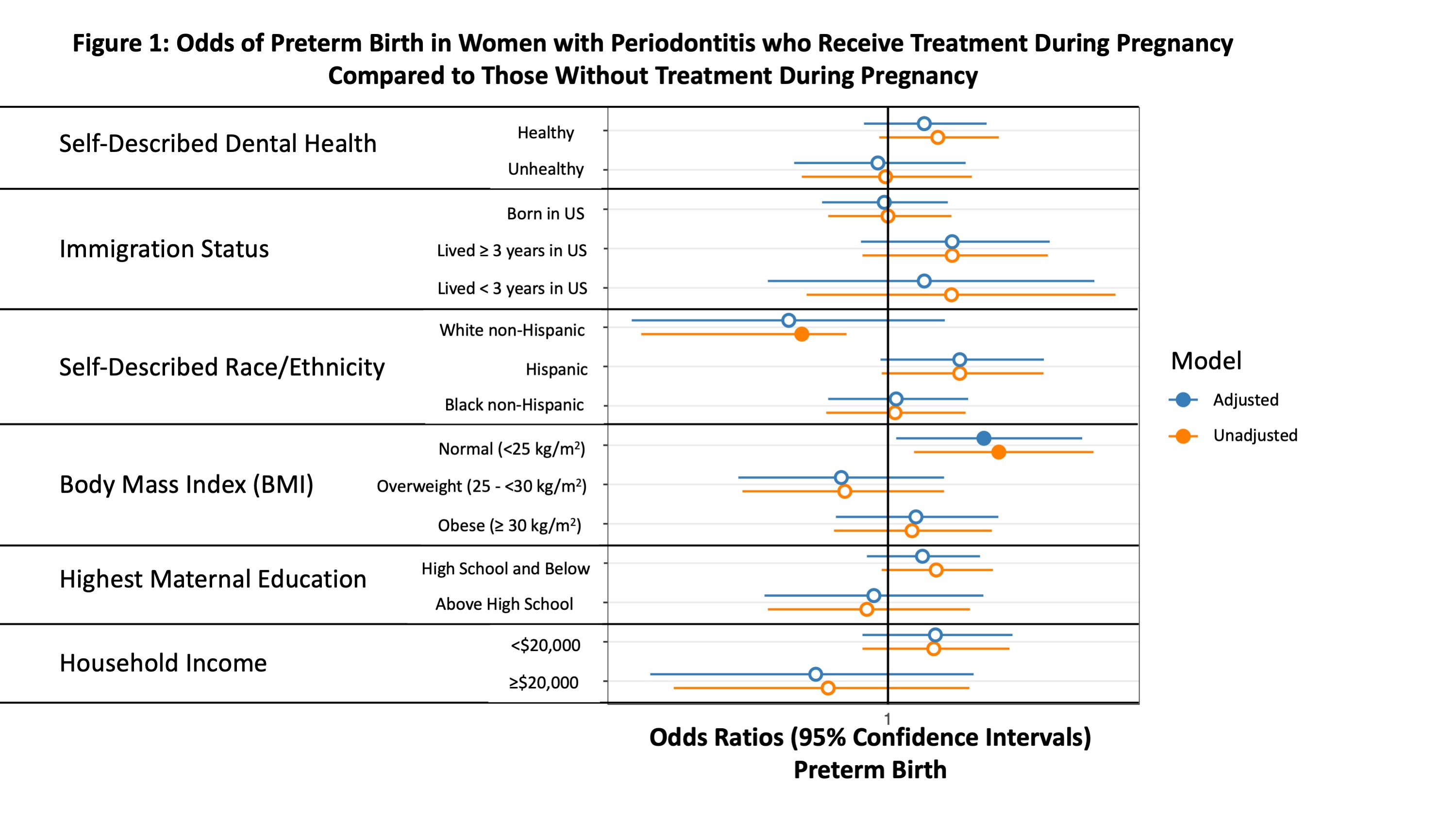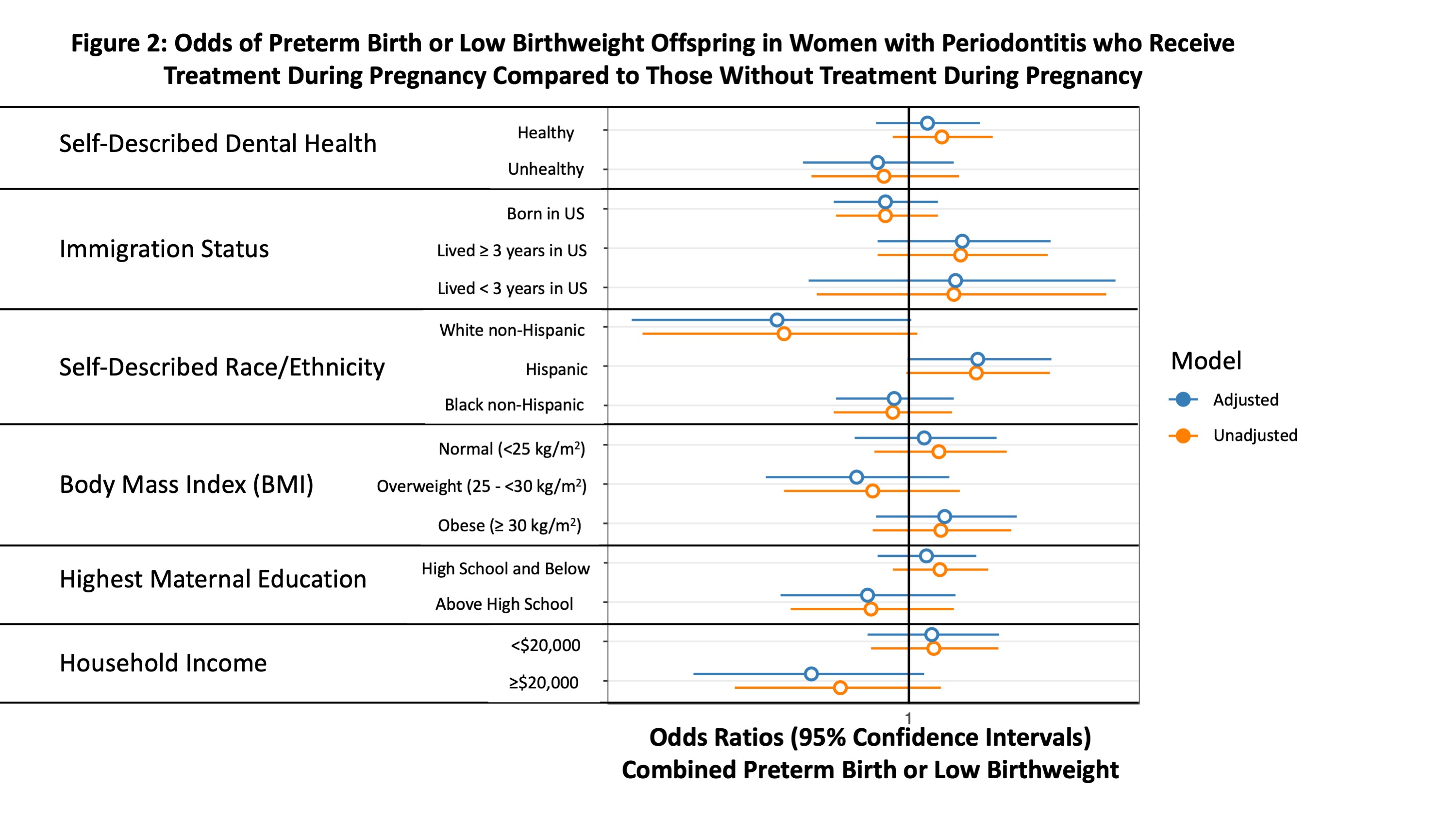Back
Neonatal General
Category: Abstract Submission
Neonatology General 3
379 - Non-Surgical Periodontal Treatment During Pregnancy and Rates of Preterm Birth and Offspring Low Birthweight
Friday, April 22, 2022
6:15 PM – 8:45 PM US MT
Poster Number: 379
Publication Number: 379.133
Publication Number: 379.133
Gregory C. Valentine, University of Washington, Tacoma, WA, United States; Krystle M. Perez, University of Washington School of Medicine, Snohomish, WA, United States; adino Tsegaye, University of Gondar / University of Washington, Seattle, WA, United States; Daniel A. Enquobahrie, University of Washington, Seattle, WA, United States; David Couper, UNC Chapel Hill, Chapel Hill, NC, United States; James D. Beck, University of North Carolina, Chapel Hill, NC, United States; Rachel Umoren, University of Washington School of Medicine, Seattle, WA, United States; Kjersti Aagaard, Baylor College of Medicine, Houston, TX, United States; Christy M. McKinney, University of Washington School of Medicine and Seattle Children's Research Institute, Seattle, WA, United States

Gregory C. Valentine, MD, MED, FAAP (he/him/his)
Assistant Professor of Pediatrics, Division of Neonatology
University of Washington
Seattle, Washington, United States
Presenting Author(s)
Background: Periodontitis during pregnancy is associated with increased risk of preterm birth (PTB) or offspring low birthweight (LBW), but randomized controlled trials evaluating periodontal treatment during pregnancy have not shown preventive benefit. Periodontitis treatment (specifically, dental root planing and scaling) is pro-inflammatory, and hence may not ameliorate PTB, but serve to further increase risk. Thus, gravidae with differing baseline states of periodontal inflammation who receive this treatment may experience varying birth outcomes.
Objective: We sought to determine association of dental scaling and root planing during pregnancy on rates of PTB or LBW among sub-groups of gravidae defined by characteristics, inclusive of vulnerabilities associated with social determinants of health.
Design/Methods: We performed a per-protocol analysis of data from 1,455 participants of the Maternal Oral Therapy to Reduce Obstetric Risk (MOTOR) randomized controlled trial evaluating dental planing and root scaling on risk of PTB ( < 37 weeks’ gestation) or LBW ( < 2,500g). Using adjusted logistic regression to control for confounders, we evaluated associations of periodontal treatment in pregnancy compared to not receiving treatment during pregnancy on rates of PTB or LBW among women with known periodontitis of the following subgroups: body mass index (BMI), self-described ethnicity, household income, highest maternal education level, and immigration status.
Results: Dental scaling and root planing during pregnancy was associated with increased adjusted odds ratio (aOR) of PTB among those with a normal BMI (20-25 kg/m2) (aOR 2.21 (95% confidence interval (CI) 1.07-4.98), but not among individuals with overweight or obese BMIs (BMI 25- < 30 kg/m2 aOR 0.68, 95% CI 0.29-1.59; BMI ≥30 kg/m2 aOR 1.26, 95% CI 0.65-2.49; Figure 1). Treatment during pregnancy was nominally associated with a non-significant lower odds of PTB/LBW among individuals who self-described as White non-Hispanic (aOR 0.35, 95% CI 0.11-1.02) and a non-significant higher odds of PTB/LBW (aOR 1.73, 95% CI 0.99-3.11) among self-described Hispanics (Figure 2).Conclusion(s): In this sub-study, dental scaling and root planing was associated with increased odds of PTB among individuals of normal BMI but not in women of higher BMIs. Variable obstetric outcomes related to social determinants of health may exist related to periodontitis treatment during pregnancy, and further studies exploring this relationship are needed.
Odds of Preterm Birth in Women with Periodontitis Who Receive Treatment During Pregnancy Compared to Those Without Treatment During Pregnancy
Odds of Preterm Birth or Low Birthweight Offspring in Women with Periodontitis Who Receive Treatment During Pregnancy Compared to Those Without Treatment During Pregnancy
Objective: We sought to determine association of dental scaling and root planing during pregnancy on rates of PTB or LBW among sub-groups of gravidae defined by characteristics, inclusive of vulnerabilities associated with social determinants of health.
Design/Methods: We performed a per-protocol analysis of data from 1,455 participants of the Maternal Oral Therapy to Reduce Obstetric Risk (MOTOR) randomized controlled trial evaluating dental planing and root scaling on risk of PTB ( < 37 weeks’ gestation) or LBW ( < 2,500g). Using adjusted logistic regression to control for confounders, we evaluated associations of periodontal treatment in pregnancy compared to not receiving treatment during pregnancy on rates of PTB or LBW among women with known periodontitis of the following subgroups: body mass index (BMI), self-described ethnicity, household income, highest maternal education level, and immigration status.
Results: Dental scaling and root planing during pregnancy was associated with increased adjusted odds ratio (aOR) of PTB among those with a normal BMI (20-25 kg/m2) (aOR 2.21 (95% confidence interval (CI) 1.07-4.98), but not among individuals with overweight or obese BMIs (BMI 25- < 30 kg/m2 aOR 0.68, 95% CI 0.29-1.59; BMI ≥30 kg/m2 aOR 1.26, 95% CI 0.65-2.49; Figure 1). Treatment during pregnancy was nominally associated with a non-significant lower odds of PTB/LBW among individuals who self-described as White non-Hispanic (aOR 0.35, 95% CI 0.11-1.02) and a non-significant higher odds of PTB/LBW (aOR 1.73, 95% CI 0.99-3.11) among self-described Hispanics (Figure 2).Conclusion(s): In this sub-study, dental scaling and root planing was associated with increased odds of PTB among individuals of normal BMI but not in women of higher BMIs. Variable obstetric outcomes related to social determinants of health may exist related to periodontitis treatment during pregnancy, and further studies exploring this relationship are needed.
Odds of Preterm Birth in Women with Periodontitis Who Receive Treatment During Pregnancy Compared to Those Without Treatment During Pregnancy

Odds of Preterm Birth or Low Birthweight Offspring in Women with Periodontitis Who Receive Treatment During Pregnancy Compared to Those Without Treatment During Pregnancy

